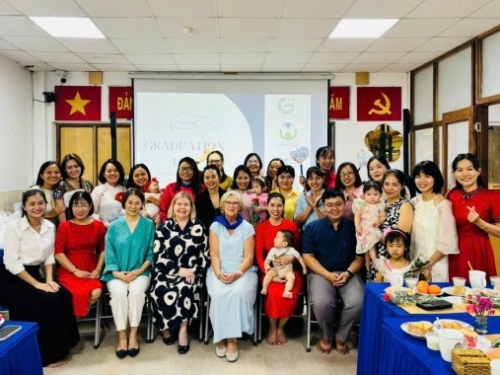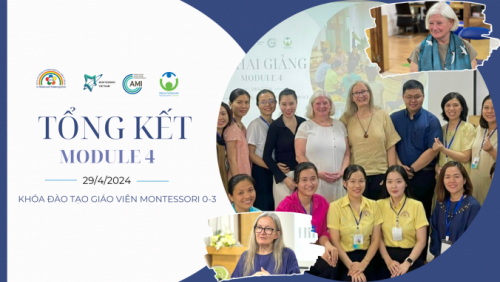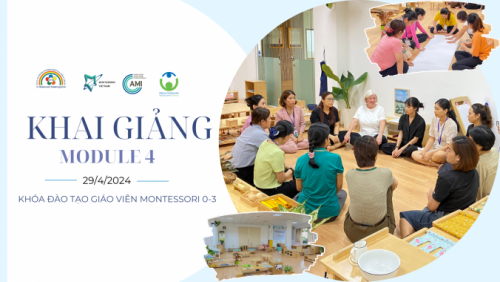I. Overview: The Golden Period of Intellect and Character Development
Between the ages of 3 and 6, children enter a period of remarkable development—referred to as the golden period for shaping intellect and character. During this time, children transition from absorbing knowledge passively and unconsciously to acquiring it with conscious intent, actively seeking and processing information through their senses. Maria Montessori described this phase as one where children explore the world with open hearts, sparkling curiosity, and hands eager to engage.
In a Montessori program, the environment is not merely a place for learning but a nurturing space where children are empowered to explore, discover, and grow. Every corner of the classroom, from practical life activities to sensory materials, is meticulously prepared to ignite a passion for learning deep within the child. Children not only learn to understand the world but also to appreciate it—from small acts like caring for a flower to completing complex tasks with their own hands.
This stage is not only a time for intellectual growth but also for cultivating a strong, confident, and independent character. Through daily learning and experiences in the Montessori environment, children build a solid foundation for future growth, encompassing physical, mental, and emotional development.
II. Practical Life Activities: Independence from the Simplest Actions
1. Supporting Life: Connecting with the World Around Them
Practical life activities in Montessori go beyond teaching everyday skills—they allow children to connect with their environment. By performing tasks such as dressing themselves, washing dishes, wiping tables, or caring for plants, children engage in meaningful work that fosters independence.
Through these activities, children learn to recognize their role in the environment and understand that even small actions contribute to the harmony of the community. These tasks not only enhance fine motor skills but also instill cultural values, a sense of responsibility, and empathy for the world around them.
2. Adapting to Life: Building Self-Reliance
Montessori believes children learn best through hands-on experience. When given the freedom to do things themselves, they not only refine their skills but also develop adaptability. Practical life lessons enable children to experience the joy of completing tasks independently, fostering confidence and internal discipline.
3. Building Character Through Practice
Each activity helps children develop focus and learn to complete tasks systematically. Repeated actions not only enhance skills but also nurture patience, organization, and self-control, laying the groundwork for a strong and balanced character.
4. "Normalization": The Ideal State in Montessori
In Montessori, “normalization” refers to the state in which children freely choose work they love and perform it with deep focus and joy. During this time, children experience satisfaction from the learning process itself, rather than external praise or pressure. In this state, children develop self-regulation, a sense of harmony within their environment, and core values such as order, empathy, and responsibility.
III. Sensorial Development: The Gateway to the World
1. Sensorial Materials: Experience and Abstraction
Montessori features unique sensorial materials that help children explore the world through sight, hearing, smell, taste, and touch. These experiences gradually build abstract concepts of the world.
For example, children learn about size through the Pink Tower, differentiate sounds with Sound Boxes, and explore textures with Rough and Smooth Boards. These activities not only develop logical thinking but also enrich imagination, preparing children for future studies in mathematics and science.
2. Connecting the Senses: Comprehensive Experiences
While using sensorial materials, the senses operate independently yet harmoniously, enabling children to experience the world comprehensively. This interconnectedness fosters creativity, problem-solving skills, and logical thinking.
IV. Language Development: Unveiling the Power of Words
1. Language in Every Breath
From ages 3 to 6, children are particularly sensitive to language. During this period, they not only learn to communicate but also explore the structure, grammar, and deeper meanings of words.
Montessori creates a rich language environment where children expand vocabulary through picture cards, storytelling, reading books, and tactile activities like tracing sandpaper letters. These lessons ignite interest, showing children that language is not just a tool for communication but also a means of creativity and connection.
V. Mathematics in the Montessori Program
In Montessori, mathematics is not an abstract subject but the language of order and logic, closely tied to real-life experiences. Children learn math through materials like number rods, bead chains, and number boards, which make numbers and operations tangible and engaging.
Every math activity is designed to build logical thinking, problem-solving skills, and confidence in understanding complex concepts. Mathematics becomes an exploration of the world’s order and logic, making abstract concepts clear and relatable.
The Montessori Journey: A Foundation for Life
The Montessori program for children aged 3-6 is not just about understanding the world but about discovering themselves. Each day in the Montessori environment offers opportunities for intellectual, personal, and spiritual growth, laying a strong foundation for their future.
Maria Montessori once said: “Education is not something which the teacher does, but a natural process which develops spontaneously in the human being.” The Montessori program embodies this philosophy—guiding children to explore, learn, and love the world in their own unique way.
Sincerely,
Tiny Flower Montessori
Others:





